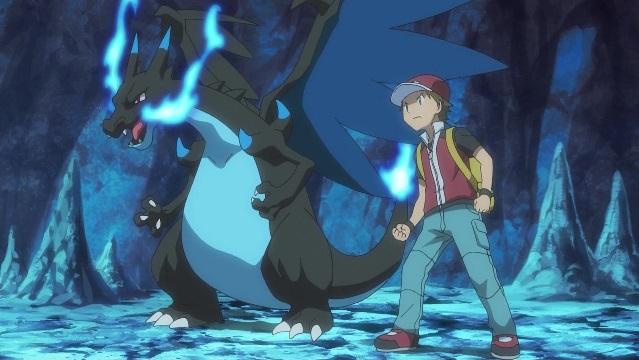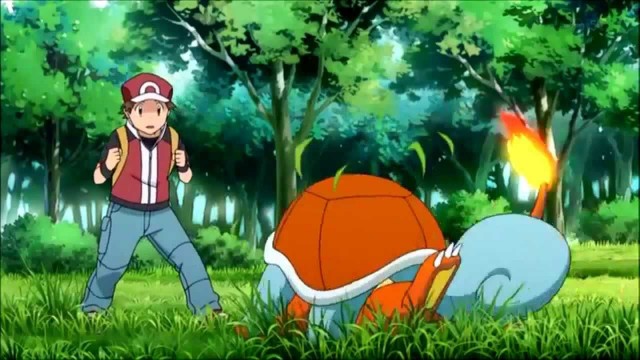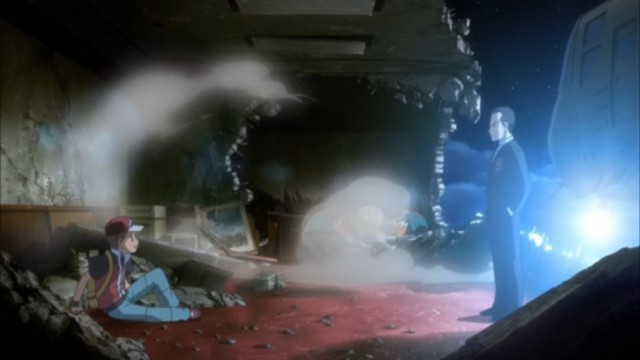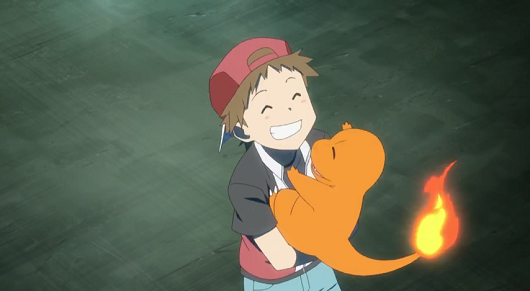
As someone who experienced Pokémon Red, the start of the anime, and traded Pokémon cards at the height of its playground popularity, I was pretty excited when Pokémon Origins was first announced. In case you haven’t had a chance to watch it yet, Nintendojo has already posted an analysis of each episode of the series, so I’d recommend taking a look at those if you are looking for a more in-depth analysis of each episode.
Unlike the regular Pokémon anime, which frequently introduces its own towns, gyms and characters, Pokémon Origins specifically follows the story of Pokémon Red and Blue – right down to the opening, where a player selects a “New Game” and later continues it at the start of each episode. Those familiar with the games will immediately get nostalgic shivers running down their spine as Professor Oak welcomes you to the world of Pokémon and sends you out to catch ‘em all. From there, the evocative battle music sounds and we are immediately greeted with a battle between a Gengar and Nidorino, just like at the start of both the games and the regular Pokémon anime.
But Origins isn’t simply content to be a retelling of the first series of the anime with a few added game-specific references. It contains noticeable differences in its art, characters, and general presentation of the world. Red’s rival, for example, isn’t cheered on by groups of girls while driving off in a red sports car, like the Gary that Ash squares off with. The characters in general are all relatively toned down in their presentation– as least as far as they can be within the Pokémon universe. As a result of this, it becomes surprisingly clear how different everyone in the anime actually is from their video game counterparts. Sure, this may just be in part due to the fact that it’s hard to have much character development in four episodes, but I still couldn’t imagine Origins’ more sober Brock, chasing after countless women like he does normally!
However, just because the presentation is slightly more restrained, it doesn’t mean that Pokémon Origins lacks any of the excitement inherent to the game or the original anime. The battles in particular are a joy to behold. They have a real sense of force to them, from Charizard’s fist smashing into Blastoise, to the hole left in the floor when Seismic Toss is used. While the traditional anime series has its fair share of destruction, the scenery here feels a lot more substantial and weighty– in the original, it still seems like a toned-down version of Dragon Ball Z, where rocks are smashed to pieces with relative ease (even without the use of Rock Smash).
These, perhaps minor, changes add to a far more vicious array of battles than those faced by Ash. An example of this can be seen in the first fight between Red’s Charmander and Blue’s Squirtle, where Squirtle visibly pounces and hangs onto Charmander when using Bite.

These changes have the effect of making the four episodes feel decidedly grittier, in much the same way that the manga is (as mentioned in Nintendojo’s original thoughts on the series). The ever so slightly darker approach to the series carries on in the actual themes of each episode as well, which have more mature elements to them. Team Rocket, for example, are a genuine threat to Pokémon and society here, rather than a crazy trio in a Meowth balloon. As a series targeted mainly at children, Pokémon doesn’t usually discuss themes like death, but Origins doesn’t shy away from the fact that Team Rocket beats Cubone’s Mother to death with an electric rod. Red’s adventure in Lavender Town, meanwhile, focuses far more on the Pokémon Tower’s role as a place for deceased Pokémon, rather than simply as a stop-off to get a ghost Pokémon. While the episodes don’t become dominated with these kinds of more serious issues, their inclusion seems to indicate that Pokémon Origins was intended to be for a wider audience than the original anime.

This is most likely linked to the fact that Red and Blue (the video games rather than the trainers!) are 18 years old now in Japan. Fundamentally though, even though it is enjoyable in its own right, it’s still going to be those who grew up on the original games that will find the most to love here. It is littered with nuggets of nostalgia that pull you back to your first adventure in Kanto; from the appearance of Mr. Fuji and Pokémon stamina bars in gym battles, all the way to the Pokémon Hall of Fame at the end of the Elite Four. Heck, even TMs are in there– Kanto is still using floppy disks though, it seems!
The most disappointing fact about Pokémon Origins has to be its length though. When I first watched it, it took a few minutes of researching to figure out that I hadn’t in fact missed an episode. The second episode skips from Pewter City to Lavender Town, and Red is able to get the Fuchsia City gym badge before the third episode even starts! This is, of course, necessary due to the four-episode arc, and the narration at the start immediately lets you catch up with the journey, but it just highlights that the series could have easily been expanded beyond this.

I know that this was intended to be a special rather than a full series, but it was so enjoyable to watch that I really hope they decide to revisit the idea again. This isn’t the first time that there has been a mini-series (there has also been Pokémon Chronicles), but the tone of the series is so different to the normal anime, there is certainly the potential for it to exist as a spin-off series in its own right.
It’s been a while since I tuned into the adventures of Ash Ketchum– I stopped watching when he finished his second tour around Kanto– but the grittier nature of this could certainly serve to pull me, and perhaps other older fans, back to the cartoon. Red’s adventure in Kanto is effectively finished at the end of this, but there’s still Johto and 100 more Pokémon to catch in the west that could be explored in another special!
With the original games recently seeing a revival thanks to Twitch, I certainly don’t think that anyone would object to the idea of revisiting Johto once again.




 ShareThis
ShareThis







I’m not exactly sure the means to watch this, but it sounds very intriguing. I will look for it!
Yes, please tell us where we can watch these!
The Pokemon TV app on iOS and Android devices is where they were originally aired. I’m not sure if they’re still available on the service (which is totally free by the way). Nintendo’s YouTube page might have them, as well. If anyone out there knows for sure where the episodes can be seen now, though, let us all know =)
Unfortunately, they are no longer on the Pokemon website. I think the only way to watch them currently is via YouTube.